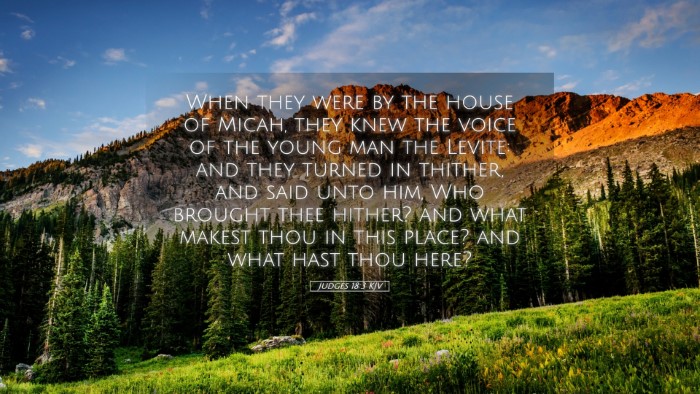Bible Commentary on Judges 18:3
Verse Context: Judges 18:3 states, "When they were by the house of Micah, they knew the voice of the young man the Levite: and they turned in thither, and said unto him, Who brought thee hither? And what makest thou in this place? And what hast thou here?" This verse sets the scene for a critical moment in the narrative of the tribe of Dan as they seek an inheritance in the land.
Introductory Observations
The events narrated in Judges 18 underscore the moral decline during the period of the Judges, characterized by a lack of unity and adherence to God's commandments. The chapter reveals the shifting allegiances and the search for identity among the tribes of Israel, particularly the tribe of Dan.
Insights from Public Domain Commentaries
Matthew Henry's Commentary
Matthew Henry provides a detailed examination of the circumstances surrounding this event. He notes that the Danites, in their quest for territory, demonstrate a blend of curiosity and opportunism. They come across Micah's house, which serves as both a religious site and a personal sanctuary, leading to a significant encounter with the Levite:
- The significance of the Levite: Henry emphasizes that the Levite's presence in Micah's household signifies a departure from traditional Levitical service, illustrating the moral compromise within Israel.
- Dialogue with the Levite: The questioning of the young Levite highlights a blend of camaraderie and suspicion among the tribes, showcasing their eagerness to understand his situation and possibly recruit him for their own purposes.
- Inquiry and identity: The Danites' inquiry, "Who brought thee hither?" implies a deeper quest for both personal and tribal identity amidst the chaos of their surroundings.
Albert Barnes Commentary
Albert Barnes reinforces the interpretation of this encounter as a reflection of broader societal disarray. Barnes points out:
- The role of the Levite: He was pivotal in the spiritual life of Micah, and his alignment with the Danites symbolizes the frailty of religious principles in a time of instability.
- Wandering of the Danites: As they search for land, their actions depict an archetype of spiritual wandering, consistent with the overall theme of Israel's disobedience and rebellion against God.
- Questions reveal intentions: The Danites' questions also reveal their intentions to carry on Micah's religious practices, thus endangering true worship and further muddying the distinction between worship of Yahweh and idol worship.
Adam Clarke's Commentary
Adam Clarke elaborates on the verse with a focus on the implications of the conversation with the Levite:
- Spiritual ambiguity: Clarke sees the Levite as a figure caught between two worlds—committed to familial loyalties yet influenced by the surrounding idolatry.
- Common interests: The Danites' warm reception of the Levite reflects a genuine draw towards something greater than their fragmented faith, yet it is marred by lack of adherence to God's commands.
- Questioning as a theme: The recurring theme of questioning throughout this passage raises issues of accountability and spiritual integrity during a time of great moral ambiguity.
Theological Reflections
The narrative of Judges 18:3 provides fertile ground for theological reflection:
- Search for identity: In the face of challenges, the characters in this story, particularly the Levite, illustrate the quest for identity—both personal and collective—which continues to resonate in contemporary theological discussions.
- Consequences of compromise: The compromises evident in this episode remind readers of the dangers inherent in negotiating one's faith for convenience, a lesson as pertinent today as in ancient Israel.
- Community and accountability: The interaction between the Danites and the Levite calls attention to the importance of community bonds and spiritual accountability, themes which remain vital for ecclesial life in the modern age.
Conclusion
Judges 18:3 encapsulates critical issues relevant to pastoral, scholarly, and personal reflection. Through the examination of this passage and its application, some of the most profound questions regarding faith, identity, and community arise. Each commentator sheds light on these themes, urging readers to consider the implications for their own lives and communities. In the end, the story of the Danites and the Levite serves as a cautionary tale about the importance of fidelity to God's commands amidst cultural and spiritual confusion.


